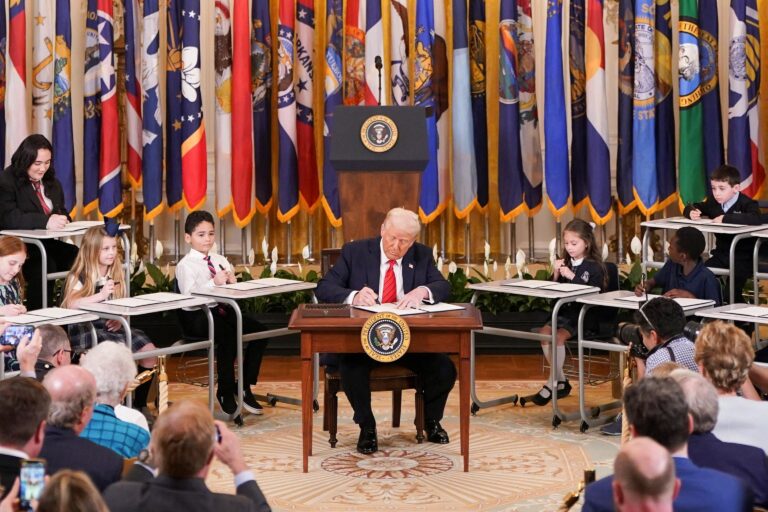The White House is currently weighing the future of the U.S. Department of Education amid growing political debate, as former President Donald Trump has publicly vowed to shutter the agency if he returns to office. This development highlights ongoing tensions over the federal government’s role in education policy, raising questions about the departmentŌĆÖs direction and impact on schools across the nation. As discussions unfold, stakeholders from across the political spectrum are closely watching what could become a pivotal moment for American education.
The White House Reviews Strategic Direction of Education Department
The Biden administration is currently undertaking a comprehensive evaluation of the U.S. Department of EducationŌĆÖs strategic priorities. This review comes amid ongoing debates about the departmentŌĆÖs role in shaping national education policy and resource allocation. Officials aim to align future initiatives with emerging educational challengesŌĆöfrom remote learning advancements to equitable funding for underserved communities. The assessment will also consider the potential restructuring of various programs to enhance efficiency and impact.
Meanwhile, former President Trump continues to advocate for the closure of the department, arguing it represents federal overreach and encroachment on state education systems. His position highlights a broader ideological divide on the federal governmentŌĆÖs involvement in education. Below is a summary of key positions regarding the departmentŌĆÖs future:
- Biden Administration: Strengthen federal support, modernize policies, and expand access to quality education.
- Trump Administration (former): Dissolve the department, returning full control to states and local authorities.
- Education Advocates: Preserve department functions while increasing accountability and transparency.
| Stakeholder | Priority | Goal |
|---|---|---|
| Biden Team | Inclusion & Equity | Close achievement gaps |
| Trump Supporters | State Control | Eliminate federal oversight |
| Teachers Unions | Funding | Increase federal investment |
Implications of Potential Closure on Federal Education Policy and Funding
The proposed dismantling of the Department of Education could trigger a seismic shift in federal education initiatives. Funding streams that currently support disadvantaged schools, special education, and federal student aid programs might face immediate disruption. States could be left scrambling to fill gaps without the centralized guidance and resources traditionally provided by the department. Such a move may also undermine nationwide standards that aim to ensure equal educational opportunities across diverse communities, potentially exacerbating existing inequalities.
Key areas likely to be affected include:
- Federal grants for public schools and educational programs
- Student loan management and default protections
- Enforcement of civil rights in education
- Data collection and nationwide academic assessments
| Policy Area | Current Federal Role | Potential Impact if Closed |
|---|---|---|
| Title I Funding | Distributes funds to low-income schools | Risk of funding cuts, increased state burdens |
| Higher Education Loans | Manages federal student loan programs | Collection and management uncertainties |
| Civil Rights Oversight | Enforces anti-discrimination laws | Potential decline in protections |
Stakeholder Reactions and the Political Debate Surrounding Education Department’s Fate
Reactions from education advocates, politicians, and community leaders have poured in as discussions about restructuring or potentially dissolving the Department of Education gain momentum. Supporters of the move argue that scaling back the department would reduce federal overreach and return greater control to states and local school districts. Critics counter that such a drastic measure would undermine national standards, exacerbate inequalities, and hinder progress in key areas such as special education and continued funding for public schools.
The debate has also reignited sharp partisan divides. Here’s a breakdown of key stakeholder positions:
- Democrats: Generally oppose closure, emphasizing the departmentŌĆÖs role in promoting equity and accountability.
- Republicans: Many advocate for downsizing or abolition, citing inefficiencies and a belief in decentralized education governance.
- TeachersŌĆÖ unions: Firmly against any move to eliminate the department, highlighting risks to funding protections and teacher support.
- Parents and students: Views are mixed, with some welcoming local control and others fearing loss of protective federal guidelines.
| Stakeholder | Position | Primary Concern |
|---|---|---|
| Education Advocates | Oppose Closure | Equity and funding stability |
| Republican Lawmakers | Support Downsizing | Reduce federal control |
| TeachersŌĆÖ Unions | Strongly Opposed | Protect teacher rights and resources |
| Local School Boards | Mixed Views | Autonomy vs. funding dependency |
Recommendations for Navigating the Future of Federal Education Oversight
As debate continues over the future structure and role of the Department of Education, stakeholders emphasize the importance of a balanced approach that preserves essential federal oversight while empowering local and state authorities. Experts advocate for a framework that maintains accountability measures without stifling innovation or marginalizing community voices. Key recommendations include:
- Enhanced collaboration between federal, state, and local agencies to ensure educational equity
- Streamlining regulations to reduce bureaucratic hurdles and focus on outcomes
- Targeted funding aimed at underserved populations to close achievement gaps
- Data transparency to track progress and inform policy decisions effectively
Furthermore, policymakers are exploring adaptive governance models that could allow the Department to transition into a more advisory and support-centric role. This would involve a redistribution of responsibilities as detailed below, aiming to foster a nimble yet comprehensive federal education presence:
| Function | Current Oversight | Proposed Shift |
|---|---|---|
| Policy Development | Federal | Joint Federal-State |
| Funding Allocation | Federal | Federal with Local Flexibility |
| Compliance Monitoring | Federal | State-Led with Federal Review |
| Research & Innovation | Federal | Federal and Academic Partnerships |
Future Outlook
As debate continues over the future of the Education Department, the White House faces mounting pressure to clarify its stance amid conflicting views within the administration. With former President Trump publicly vowing to shutter the agency, the discussion highlights broader questions about the federal government’s role in education policy. As the nation watches closely, decisions made in the coming weeks could reshape how education is governed and funded across the United States.




